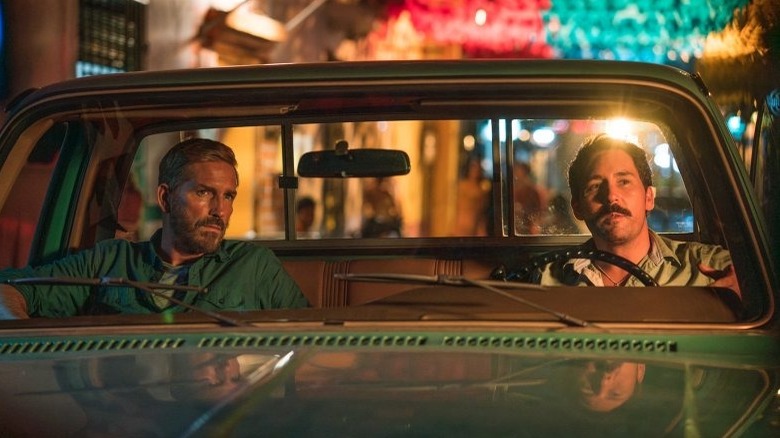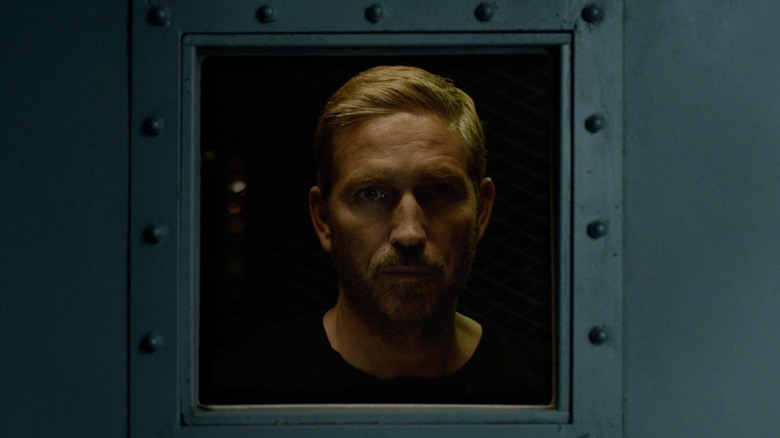Why Sound Of Freedom Blew Everyone Away At The Box Office
When it comes to the performance of 2023 movie releases, there's been a great deal of surprise and tumult. Superheroes no longer reign supreme at the box office, and longstanding franchises like "Indiana Jones," "Transformers," and "Mission: Impossible" have underwhelmed. Instead, existing toy and entertainment brands seem to be driving audiences to theaters, and "The Super Mario Bros. Movie" and "Barbie" are the number one and two movies of the year so far. With the WGA and SAG-AFTRA strikes poised to wreak havoc on the fall release schedule, it's unlikely any upcoming titles will be able to challenge them for the top spot.
One low-budget, non-franchise, and non-IP contender could also end up in the list of the year's highest-grossing films: "Sound of Freedom." It currently sits in 10th place, just behind "John Wick: Chapter 4" and "Ant-Man and the Wasp: Quantumania," and just ahead of "Indiana Jones and the Dial of Destiny" and "Mission: Impossible – Dead Reckoning Part One." Sandwiched in between all these expensive and highly anticipated tent poles is a movie about — of all things — child trafficking. How "Sound of Freedom" became so popular and lucrative is quite a story and one that's as tricky to untangle as the film's subject matter.
A studio that taps into crowdsourcing, a drawn-out battle over distribution rights, a viral marketing campaign, culture wars, and conspiracy theories all combined to make "Sound of Freedom" the hit Hollywood didn't see coming. This is how it all happened.
How much did Sound of Freedom make at the box office?
To date, "Sound of Freedom" has made over $175 million domestically — and this is before its international release through the summer and fall of 2023. At the time of writing, it's been in North American theaters for six weeks, and average ticket sales are only just starting to drop off. There was a time when any total gross over $100 million meant a movie was a certified blockbuster. However, in the years just before the pandemic and again in 2023, multiple movies crossed the billion-dollar mark. "Sound of Freedom" is unlikely to get anywhere near a billion, but that shouldn't skew the perception of whether or not it's a hit. By the one metric that matters — return on investment — it is a huge success.
Every other movie in the top 10 — and even some that have fallen off of the list — had much larger production and marketing budgets. For example, Disney's "The Little Mermaid" remake, which currently ranks fifth having brought in just under $300 million domestically, came with a price tag of around $250 million and an estimated advertising cost of $140 million. International ticket sales have helped it break even and then some, but "The Little Mermaid" won't make back its investment ten times over like "Sound of Freedom" will. The big hitters at the box office like "The Super Mario Bros. Movie" and "Barbie" also easily earned their money back many times over, and "Sound of Freedom" easily sits alongside this esteemed company.
Reviews were decent and word-of-mouth was strong
"Sound of Freedom" has become a socio-political and cultural phenomenon. Even if it had never been a topic of conversation for reasons other than its filmmaking, it probably still would've done well at the box office. That's because initial reviews were strong enough to recommend it and word-of-mouth was extremely effusive.
Variety's Owen Gleiberman called it a "solidly made and disquieting thriller," and a "compelling movie that shines an authentic light on one of the crucial criminal horrors of our time." Early reaction on Twitter and other social media sites was even more positive and to the point; fans urged their friends and followers to go see it. Compared to its competition — the lukewarmly reviewed "Indiana Jones and the Dial of Destiny" and the critically panned "Insidious: the Red Door," "Sound of Freedom" seemed like a safe enough bet.
There is a caveat, however. Many critics in the first wave of reviews either weren't aware of the film's direct and indirect connections to QAnon or they were written for outlets that lean conservative. And some of the positive reviews, like Gleiberman's, were careful to balance their praise with condemnation of conspiracy theories. Rotten Tomatoes doesn't just separate critics from audiences; users can also search for reviews penned by top critics, and only a handful have commented on "Sound of Freedom" thus far. Its score has also fallen since its release, but nevertheless, the film got a boost from the good press, even if its target audience was seeking out voices they trusted.
The subject matter had a built-in audience
There's no way to talk about "Sound of Freedom" without talking about child trafficking, QAnon, and the fine line between rational and irrational interest in this social issue. The film centers on Tim Ballard, a real-life figure and former CIA and Homeland Security agent who went on to found (then leave) Operation Underground Railroad. It should be noted that co-writer and director Alejandro Monteverde had the idea for the film before he'd heard of Ballard, and the events depicted in "Sound of Freedom" are fictionalized. While every decent person cares about the plight of real trafficked children, the controversial topic has become an obsession in fringe circles, where exaggerated statistics and outlandish claims are frequently — and dangerously — cited without evidence.
"Sound of Freedom" doesn't bring to life the most deranged QAnon fantasies. No Hollywood celebrities or enemies of the political right are kidnapping and murdering children to harvest the adrenochrome in their blood. But it explores the topic that often serves as an entry point to exposure to such radical ideas, so believers across the conspiracy theory spectrum were primed and ready to adopt "Sound of Freedom" as their own. Not to mention the fact that Jim Caviezel has made statements that sound like support for QAnon ideologies. That, combined with the movie's patriotic and Christian undertones, meant "Sound of Freedom" had a sizable built-in audience. An estimated 17 to 22% of Americans may harbor QAnon-like views, and a milder embrace of similar ideas is now common in some conservative and Christian political circles. Support of "Sound of Freedom" came to be seen as support for these causes.
It was vague enough to appeal to the general public
Though some audience members surely saw more than what was on the screen in "Sound of Freedom," the movie itself — despite its dark subject matter — is familiar and crowd-pleasing enough to cast a wider net and capture at least some casual moviegoers. From its poster and its trailer, "Sound of Freedom" seems like a military-tinged action thriller. The kind of serious-minded, masculine but melodramatic flick that often gets called a "dad movie." Not unlike "American Sniper" or "13 Hours: The Secret Soldiers of Benghazi," "Sound of Freedom" features a hero affiliated with the armed services, bad guys in a foreign land, and a plot that takes the audience to some upsetting places all while sticking to the comfortable conventions of the special ops sub-genre.
To the consumer of pop culture just looking for something to do on a Friday night, nothing about "Sound of Freedom" — with the possible exception of its title and its lead actor's name high up on the poster — seems out of the ordinary. In addition to Caviezel, its cast includes well-respected, mainstream actors such as Bill Camp and Mira Sorvino. In other words, plenty of people went to see the film not because they were specifically interested in child trafficking or involved with QAnon but because they just like these kinds of movies, of which there are relatively few released each year.
Jim Caviezel has a faith-based fan following
"Sound of Freedom" has been called a faith-based movie in part because its distributor — the Utah-based Angel Studios — produces mostly conservative Christian content. The company's own language says it's a platform for "stories that amplify light." The film's viral tagline, "God's children are not for sale," is also coded as culturally Christian, but what really drew in the churchgoing crowd was the involvement of Jim Caviezel.
Caviezel's first acting job was in Gus Van Sant's 1991 queer drama, "My Own Private Idaho," which starred the late River Phoenix and Keanu Reeves. Caviezel has a small role as an airline clerk. He was a journeyman actor until 2004, appearing in films such as "Wyatt Earp," "The Rock," "G.I. Jane," "The Thin Red Line," and "Angel Eyes" before landing the part that would change his life and his career forever. Famously, he portrayed Jesus in Mel Gibson's 2004 hit, "The Passion of the Christ," arguably the last time a faith-based film made such an impact at the box office. Because of Gibson's political and religious conservatism, "The Passion of the Christ" became something of a bellwether for fans' beliefs too.
Caviezel went public with his own devout Catholicism and has since been a favorite son of religiously orthodox and right-leaning media consumers. However, as Caviezel's own beliefs have migrated from traditional Catholic theology and into QAnon territory, he's also become a favorite son of fringe groups with more extreme views.
Ticket giveaways aimed to fill seats
"Sound of Freedom" may have been a grassroots success story, but grassroots doesn't mean that no strategy was involved. While "Barbie" was the viral marketing champion of the summer, spawning a pink girl-powered revolution by way of memes and corporate partnerships, "Sound of Freedom" used an entirely different scheme to fill seats, and it's one that's thrown into question just how many people have actually seen the movie.
Both on their website and in a tacked-on recorded message at the end of the movie, Angel Studios invites fans to purchase a ticket to "Sound of Freedom" for someone who may not be able to afford it. This pay-it-forward approach is in keeping with the ethos of the film's churchgoing fanbase. Buying an extra ticket is a low-cost act of charity, and it makes the viewer who's just finished watching the harrowing story feel as if they're doing something to help. Those who took Angel Studios up on the suggestion certainly helped the movie's bottom line. Those pay-it-forward tickets may have accounted for around 20 percent of the film's box office.
It's unclear, however, how many people took advantage of the opportunity to see "Sound of Freedom" for free. While fans began (falsely) claiming that theater chains didn't want the film to succeed and were sabotaging screenings with broken lights and air conditioning, other reports suggested that supposedly packed showings were only half full. Regardless, enough fans spent money on tickets — for themselves and potential strangers — to make "Sound of Freedom" a legitimate hit.
Controversy surrounding its released piqued interest
It's ironic that "Sound of Freedom" is one of the biggest hits of 2023 considering it was filmed in 2018. At the time of its completion, it was owned by Fox International, a subsidiary of 20th Century Fox. After Disney's acquisition of Fox, "Sound of Freedom" ended up being owned by the House of Mouse, who had no planned release for the film. This led those who were anticipating its debut in theaters — especially the conspiratorially-minded about Hollywood — to suppose that the huge entertainment conglomerate was trying to keep the movie out of the public eye for nefarious reasons. The film's director has since explained the delay to Movieweb. Disney — known for being family friendly — didn't know what to do with many of Fox's more adult-oriented holdings. "Sound of Freedom" was a small, foreign-made movie that wasn't a logical fit for the brand and thus not a priority, especially during the COVID-19 pandemic.
Early in 2023, Angel Studios stepped in to purchase the rights to "Sound of Freedom" with the help of more than 6,000 investors who crowdfunded the effort. CEO Neal Harmon publicly ran with the idea that Disney would never release the movie, and with the backing of its new distributor, "Sound of Freedom" became the movie "they" didn't want you to see. Ultimately, the five year delay might've been a blessing in disguise. Both awareness of QAnon-like conspiracy theories and awareness of child trafficking as a salient political issue was much lower back in 2018, and "Sound of Freedom" could've premiered to much less fanfare.
Media coverage was free advertising
Once word got out that "Sound of Freedom" was QAnon-adjacent, a debate about the merits of the movie began to rage on various online forums, and an onslaught of think pieces about its success and impact began to appear. Controversies surrounding Tim Ballard and Jim Caviezel resurfaced. Ballard and his former organization have been credibly accused of having ties to QAnon and exaggerating or fabricating claims, and Operation Underground Railroad has been under investigation and criticized by some who work to end child trafficking. Though OUR denies any relationship with QAnon, Ballard's appearances as a right-wing media personality and Caviezel's unmistakably pro-QAnon statements at OUR events haven't helped. To make matters worse, one of the film's investors was arrested for attempted child kidnapping.
To some, Ballard and Caviezel are and always will be heroes, but for his part, co-writer and director Alejandro Monteverde has sought to distance himself from QAnon and politics as much as possible. He told The Guardian that Caviezel has hurt the perception of his film. Monteverde is a relatively conservative filmmaker whose previous work tackled abortion and adoption, though he's drawn a line between his beliefs and those of some of his film's fans. It's not clear, however, that he's right about the controversy being a bad thing. Every time "Sound of Freedom" was in the news or brought up on social media (which was a lot), it was free press. Sure, some people may have chosen not to see Monteverde's movie based on its associations, but others only heard about "Sound of Freedom" because of all the uproar.
Counter-programming works
"Barbie" and "Oppenheimer" might just wind up as the best examples of effective counter-programming of all time, but "Sound of Freedom" was its own kind of counter-programming. Though they couldn't be more different in tone and style, the feminist movie about the not-entirely-feminist doll and the academically dense movie about the maybe communist theoretical physicist both appeal more to left-leaning audiences. Over the course of the last decade, films have generally become more inclusive, less apt to offend, and more interested in exploring moral gray areas than cut-and-dry notions of right and wrong. "Sound of Freedom" is counter-programming to that trend.
It stars a white man whose motives (at least in the movie) are never in question. It's about a topic that's already of interest to a certain segment of the population, it leans into its culturally conservative and religious bona fides, and it's well-made enough to justify its existence. The simplest answer to the question of why "Sound of Freedom" blew everyone away at the box office is that there haven't been that many mainstream movies made for the people who want to see these belief systems reflected back at them on screen. While there's an enormous audience for "Barbenheimer," there's also — for better and worse — a pretty big and underserved audience for "Sound of Freedom." Going forward, Hollywood will have to figure out how to cater to their sensibilities, without alienating everyone else by appearing to support their most unfounded and unhinged ideas.









